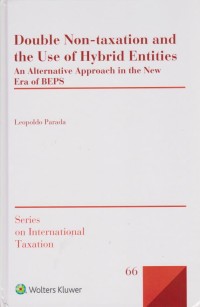
Book
Double Non-taxation and the Use of Hybrid Entities: An Alternative Approach in the New Era of BEPS
The topics of double non-taxation and hybrid entities have acquired a particular importance in a context where transformations within the tax world seem to be leading to an international commitment most materially manifested in the OECD Base Erosion and Profit Shifting (BEPS) project. In what is the first systematic in-depth critique of the BEPS Action Plan 2 with regard to hybrid entities, this timely book provides a critical review of the OECD’s approach and proposes a deeply informed alternative method based on the tax policy aims of simplicity, coherence and ease of administration.
The author analyses the interaction between the double non-taxation outcome and the use of hybrid entities in an approach not strictly linked to any specific tax jurisdiction. To this end, the analysis includes case studies and examples from a range of jurisdictions emphasizing the international tax context, including the application of tax treaties. Among the seminal matters covered are the following:
– foundations of the concepts of double non-taxation and hybrid entities, absent of the specific limitations of domestic tax legislation; – extensive analysis based on the rules of characterization of foreign entities for tax purposes in the United States, Spain, Denmark and Germany, as well as on the Poland/United States and Canada/United States tax treaties; – detailed analysis on the implications of Article 1(2) OECD Model Tax Convention and Article 3(1) Multilateral Instrument, especially having in mind the position of developing (source) countries; and – EU tax law as part of the international context, including an extensive analysis on the EU Anti-Tax Avoidance Directive (ATAD) I and ATAD II.
Detailed comparisons between the author’s proposal and other existing rules elucidate common points and deviations.
If merely for its unparalleled clarification of the issues, this book will prove of immeasurable value to practitioners, tax authorities, policymakers and academics concerned with international tax law. Beyond that, as an authoritative guide that promises to reorient the discussion to what really matters in the debate regarding double non-taxation and hybrid entities, this analysis elaborates solutions applicable to a generality of cases worldwide, and thus hugely promotes the urgent quest for alternative solutions.
Detail Information
| Call Number |
07 DOU leo
|
|---|---|
| Publisher | Kluwer Law International B.V. : The Netherlands., 2018 |
| Collation |
xxxi, 451 p, 24.5 cm
|
| Language |
English
|
| Classification |
07 DOU leo
|
| ISBN/ISSN |
9789041199911
|
| Edition |
-
|
| Subject(s) |






